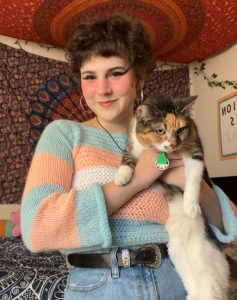
Grace Carr is a junior at Northern Arizona University studying ecology and evolutionary biology with minors in statistics and sociology. Grace found a home in sustainability when they came to NAU. However, they didn’t always feel that way. They weren’t particularly interested in sustainability before college– they were concerned about climate change, but felt more bogged down and pessimistic about it than anything else because of their identity and lack of power.
“I think there is this overwhelming sense of incapacitation and inability to change the way things work, especially when you’re a young student with a lack of power, and existing in different identities. I think all those things came together to make me feel powerless. Like my opinion and my voice didn’t matter when it comes to this huge crisis. It’s like, how does one person take down this entire empire?”
Grace was picking their major when they entered college and originally started out in biology, taking a few introductory biology courses, including Unity of Life, which looks at ecosystems, populations and nature, rather than microbiology. Grace says this class lit up the light bulb in their head that made them realize they were interested in how ecosystems function and how animal behavior influences ecosystems, and they changed their major to ecology. They realized that none of the things they were learning about, across various classes, ever existed in isolation from sustainability.
“Climate change and human evolvement has the ability to completely shape ecosystems, and exert an overpowering influence. That influence can be positive… but it can absolutely, and is often, overwhelmingly negative.”
They gained the perspective that in order to make a difference with what they were learning about environments and ecosystems, it would have to become a priority to learn more about climate change. That lead them to combine their interest in statistics and sociology to blend together into a focus on understanding the way the natural world works through a data driven lens. Through learning about sustainability, they gained a more optimistic perspective on it, and decided to try to spread this knowledge and perspective to everyone.
Currently, on the Green Fund committee, one of Grace’s top goals as the Impact Analyst is to promote sustainability and data by making it more accessible. Grace says that the way they came to understand and love sustainability was through accessibility and learning about the topic, and believes that others can learn to share that joy and love for it if it is more accessible.
“It’s very intersectional and very interdisciplinary.”
Grace says the feeling of ennui and powerlessness is possible to overcome. Learning and gaining access to more information was instrumental for Grace in being able to feel empowered. They spent a lot of time in their community learning in class, but also learning from others through clubs and organizations on campus. Seeing that others around them were motivated gave them a better understanding of the climate crisis and helped empower them.
“I think I’ve become a lot more optimistic. I think that information and knowing the reality of things, but also knowing the ways you can help personally and on a large scale, and knowing what other people are doing in the world to help… that can offset those feelings of dread and powerlessness.”
Those who don’t go to college can empower themselves too. By involving themselves in their community and surrounding themself with nature, Grace believes that everyone can be involved in some small way to help make a change.
“There is power in any form of learning. Everyone learns differently, everyone follows a path that teaches them things, and that is a really powerful tool to learn about sustainability… personal experience and community is really where the power lies.”